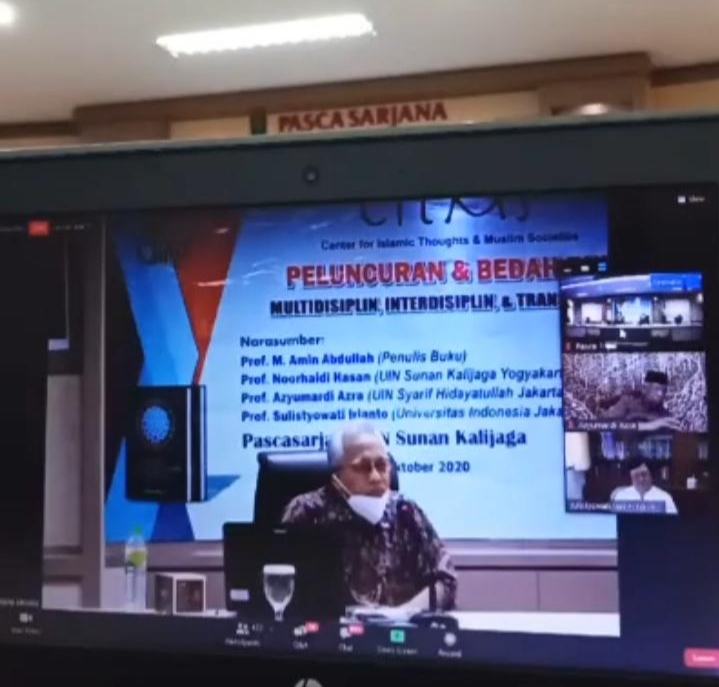“Islamic Studies is Infatuating”, on Prof. Amin HM. Amin Abdullah Book Launch and Review

Postgraduate program of UIN Sunan Kalijaga launched CIT MS (Center for Islamic Thoughts and Muslim Societies) and held a review on the book of Multidisciplinary, Interdisciplinary, and Transdisciplinary: Methods of Religious and Islamic Studies in the Contemporary Era by Prof. M. Amin Abdullah with Prof. Noorhaidi Hasan (Postgraduate Director at UIN Sunan Kalijaga), Prof. Azyumardi Azra (Professor of Islamic History and Civilization at UIN Syarif Hidayatullah), and Prof. Sulistyowati Irianto (Professor of Anthropology of Law at Universitas Indonesia) invited as the main speakers of the event. This event, collaborated with IBTimes.id, was held online using Zoom Meeting and broadcasted through Youtube Streaming and Instagram Live, 15/10/2020.
The 2 hours and 30 minutes event started with a welcoming speech of the Postgraduate Deputy Director Ahmad Muttaqin Ph.D., followed by the CIT MS Director, Dr. Muhammad Yunus, who discussed about the programs which were going to be implemented by CIT MS such as Public lecture serial, collaborative research, and research publication. The event continued by handing out the Multidisciplinary, Interdisciplinary, and Transdisciplinary: Methods of Religious and Islamic Studies in the Contemporary Era from the author, Prof. M. Amin Abdullah, to the Chairman of the University Senate Prof. Siswanto Masruri. This latest book by Prof. M. Amin Abdullah is a continued study of the Integration-Interconnection paradigm which combines religious science, Islamic thoughts, and Islamic studies in order to respond life’s challenges towards the progressing Islam.
The book explains why religious and Islamic studies undergo methodological stagnation despite the rapid development of the Era and technology. The author, Prof. Amin Abdullah, stated that methodological stagnation can be solved. In religious studies, however, there exists a tension between faith and criticism, an illuminating reason. Insider theory (mukminuna haqqa) and outsider (theoretical frameworks) participant as the observer of critical thoughts. Thus, Prof. Amin Abdullah in his book discusses how to deal with the tensions from the methodological stagnation of religious studies, and how the relationship of the six groups of knowledge (Religious, social, natural, formal, and applied science) in the modern and postmodern era.
According to Prof. Noorhaidi Hasan, this latest book by Prof. Amin Abdullah may become a manifesto for Mr. Amin regarding a new course, reflection, and vision on the future of Islamic studies in order to give contribution to the world civilization especially in Indonesia. Postgraduate of UIN Sunan Kalijaga currently becomes a laboratory for Islamic studies. Prof. Azyumardi Azra, on the other hand, stated that it is such a great fortune for UIN Sunan Kalijaga to have Prof. Amin Abdullah for he is consistent on his research. It would be better, he said, if an Intradisciplinary study (primary group of knowledge) were to be added because currently scientific research tends to go separate ways.
The woman speaker, the Professor of Anthropology of Law at Universitas Indonesia, Prof. Sulistyowati Irianto also expressed her agreement with Prof. Noorhaidi Hasan that the book is Prof. Amin Abdullah’s manifesto in the form of a new thought. Prof. Sulistyowati explained that this book tries to emphasize the Interdisciplinary, Multidisciplinary, and Transdisciplinary trend of the world knowledge where industry funds universities. However, we do not have the industry. In Indonesia, industry has its own university while the university sometimes hesitates in taking steps or even responding to the society’s social condition that needs immediate action. It is because the programs on academic development in the universities suffer from the complicated bureaucracy which have caused the universities to undergo regression.
This book by Prof. Amin gives legitimation to the academics hesitation to progress. Mr. Amin turns postgraduate into laboratory in order to reform the education culture. Prof. Amin said that all backbound of science is available in the postgraduate.
The interaction of all sciences in the Postgraduate program is more controlled. Scientific interaction happens in three ways; on how they pass through each other, creative imagination, methodological consequence, on how science interacts with social humanities, religious science, and the era of monodisciplinary, progressive, and revolutionary.
Even though religious science is not dogmatic, philosophical thoughts use logic. In this case, religion must divorce between faith and religious science regarded as a scientific system such as humanities and many others. Scientists should have an equal thought between religious science and other science in order to compile and combine them both. The results can then be put into PAUD to university curriculum. With the interaction of all sorts of science with religious science, the negotiation and reproduction do not need to be problematized. Thus, the research of Islamic studies can be widened and become fluid (not rigid). If Prof. Amin Abdullah’s thoughts can be manifested, Islamic studies is fun, said Prof. Sulistyowati. (Aulia/Weni)
